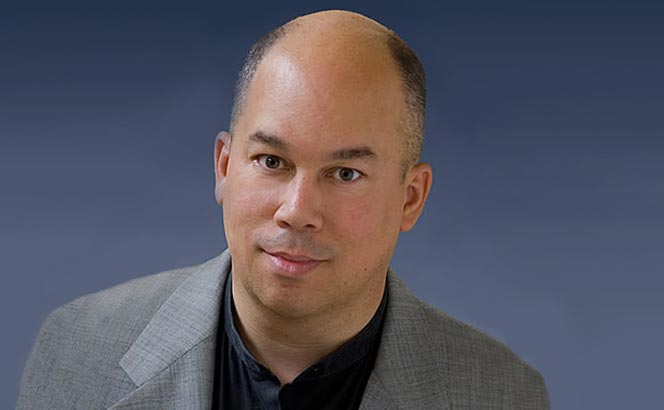
A man who has traveled much of the world and brought the Earth to the minds of the masses remains anchored in optimism, and perhaps that is the most remarkable aspect of Michael Jones.
As Google’s chief technology advocate, Jones might be expected to explain how life is better with the ubiquitous tool at the fingertips of 2 billion people. But during a recent five-day visit to Northern Arizona University, his positive messages and advice also revealed a personal belief in the potential of humanity.
In meetings with students, deans and NAU President John Haeger, and in classroom visits and a keynote presentation, Jones weaved his own encyclopedic knowledge into topics ranging from the nobility of business to career preparation. He spoke about change and the certainty of discomfort in greeting it. And he explained how widespread and nearly instantaneous access to information can be used to create a context for kinship.
|
“I think we’ve changed the comprehension of 2 billion humans about their planet,” Jones said in reference to Google Earth, which he and a few others created while “sitting around a dining table.”
“I always thought we had a very tiny understanding of the world,” Jones said. “I thought maybe we can own the planet in our minds.”
Broadening that perspective to Google’s full array of capabilities, Jones affirmed his belief that the technology tool makes the world a better place.
“We are more capable than we were before Google came around,” Jones said. “It doesn’t make us more intelligent or more wise, but it makes us more informed.”
And that claim, based as much on feeling as on quantifiable data, underlies Google’s confidence in how people will use that information.
“It’s not really about us,” Jones said. “We’re doing this thing so that people will be better informed, have better understanding and lead better lives. With more choices, they’ll be able to choose more wisely. The optimistic principle behind that is that we think they will.”
Considering what Jones sees as the requirements of managing a successful career at a time of great change, people will need all the help they can get. He advised students “to realize that what they’re learning here, and what they must be successful at, is learning how to learn. You learn enough to start the race, and every day is 95 percent working and 5 percent studying for tomorrow.”
Put another way, the effect is “a decrease in the half-life of an education,” Jones said. What someone learns in college or a professional school used to be enough preparation for a career but now that knowledge may apply for only half a career.
Continually anticipating the new skills that will be needed, Jones said, will define professionalism in the future. And not everyone will be happy about it. “The prospect that what you are is tentative because of what you learned yesterday is very uncomfortable for some people.”
Yet the future does not belong only to those who can write code or work with nanoparticles. As an engineer, Jones appreciates the power of technology as a tool, but as a well-read person with an almost Google-like breadth of recall, he also sees the need for a balance of creativity and implementation.
“I have the highest respect for the ambitions of liberal arts education. I can’t imagine a better outcome from going to college,” Jones said. In addition, though, “there’s an engineering component to fulfilling the wisdom” that comes from creativity, he said. “Engineering is the science of turning ideas into answers. One without the other is more than deficient, it’s valueless.”




